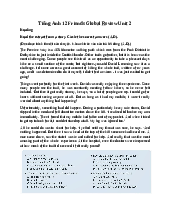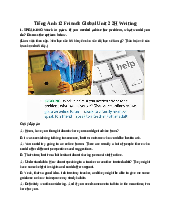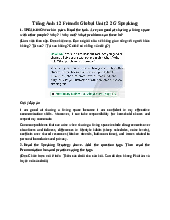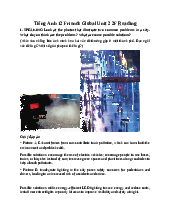





Preview text:
Tiếng Anh 12 Friends Global Unit 2 2I Culture
1. SPEAKING Work in pairs. Think of three important problems that the world
faces today. How do you think we can solve them?
(Làm việc theo cặp. Hãy nghĩ đến ba vấn đề quan trọng mà thế giới ngày nay phải đối
mặt. Bạn nghĩ chúng ta có thể giải quyết chúng bằng cách nào?) Gợi ý đáp án
- Climate change: Invest in renewable energy sources such as solar, wind, hydro, and
geothermal to reduce reliance on fossil fuels. Implement policies that promote energy
efficiency and carbon pricing to incentivize businesses and individuals to reduce emissions.
- Inequality and poverty: Prioritize education and skills training programs, particularly in
disadvantaged communities, to empower individuals with the knowledge and skills
needed to access better job opportunities. Implement progressive taxation and social
welfare policies to redistribute wealth and reduce income inequality.
- Global health crises: Invest in healthcare infrastructure, including hospitals, clinics, and
medical supply chains, particularly in developing countries. Improve access to healthcare
services through universal healthcare coverage and community-based healthcare initiatives.
2. Read the text. What solution did the British government suggest for a problem in
the 18th century? Was it successful?
(Đọc văn bản. Chính phủ Anh đã đề xuất giải pháp nào cho một vấn đề ở thế kỷ 18? Nó có thành công không?) Gợi ý đáp án
In the 18th century, the British government suggested the solution of creating an accurate
clock to address the problem of calculating longitude at sea.
This solution proved to be successful when John Harrison, a relatively unknown
carpenter and clockmaker, invented the marine chronometer, specifically his fourth sea clock known as H4.
3. Read the text again. Answer the questions.
(Đọc văn bản một lần nữa. Trả lời các câu hỏi.) Gợi ý đáp án
1 - The British government decided to try to prevent the kinds of accidents that had happended at sea in 1707.
2 - He was a carpenter rather than a well-known scientist.
3 - Because conditions on board damaged the clocks.
4 - The H probably refers to the first letter of the inventor’s surname (Harrison), and the
number 4 to the fact that it was the fourth sea clock that he had made.
5 - A TV audience was asked to choose one challenge from a list of six.
4. SPEAKING Work in pairs. The Longitude Prize is a prize for anyone that can
solve one of the problems in the list. Which one would you choose to be the challenge
for the new Longitude Prize? Why?
(Làm việc theo cặp. Giải Longitude là giải thưởng dành cho ai có thể giải quyết được một
trong các vấn đề trong danh sách. Bạn sẽ chọn cái nào là thử thách cho Giải Longitude mới? Tại sao?) Gợi ý đáp án
I would choose antibiotics because of long – term impact. Developing strategies to
prevent antibiotic resistance would have long-term benefits by preserving the
effectiveness of existing antibiotics and ensuring their availability for future generations.
This would help sustainably manage infectious diseases and improve healthcare outcomes globally.
5. Listen to a podcast. Which problem from exercise 4 was chosen as the challenge for the Longitude Prize?
(Nghe một podcast. Vấn đề nào trong bài tập 4 được chọn làm thử thách cho Giải Longitude?) Gợi ý đáp án
How can we prevent the rise of resistance to antibiotics?
6. Listen again. Choose the correct answers (a–c).
(Lắng nghe một lần nữa. Chọn câu trả lời đúng (a–c).) Gợi ý đáp án 1. a 2. a 3. c 4. b 5. a
7. SPEAKING Work in pairs. What important problem in the world would you add to the list in exercise 4?
(Làm việc theo cặp. Vấn đề quan trọng nào trên thế giới bạn sẽ thêm vào danh sách trong bài tập 4?) Gợi ý đáp án
Energy - How can we transition to renewable energy sources and achieve carbon neutrality?
Education - How can we ensure access to quality education for all, especially in underserved communities?
Biodiversity Loss - How can we halt and reverse the loss of biodiversity and protect
endangered species and ecosystems?
Gender Equality - How can we achieve gender equality and empower women and girls worldwide?
Healthcare Access - How can we ensure equitable access to affordable and quality
healthcare for all, regardless of income or location?



